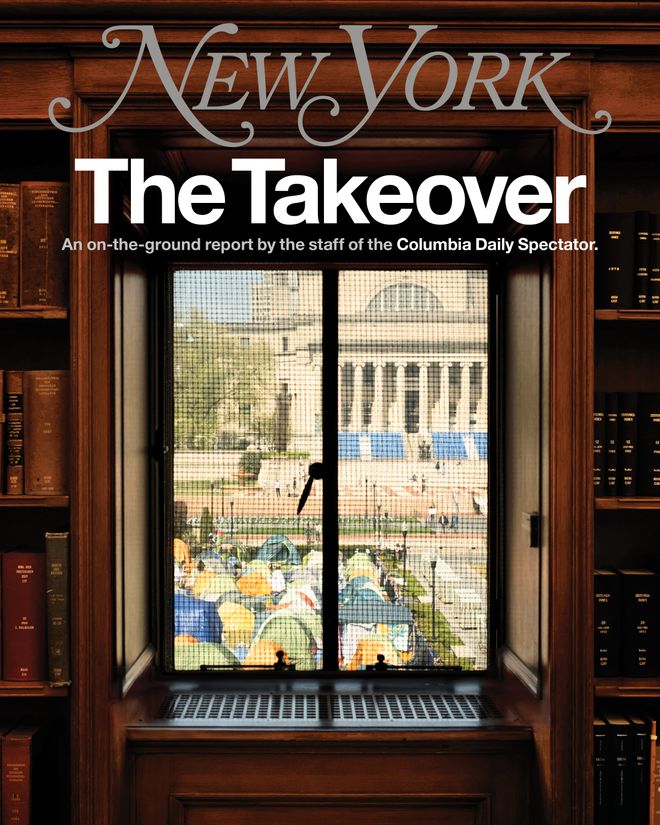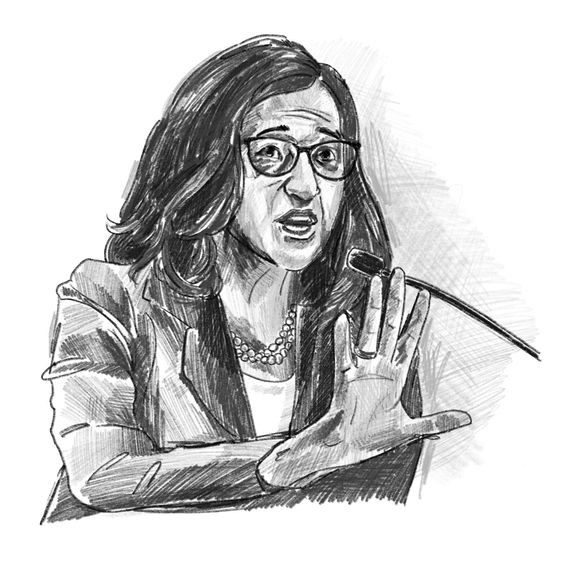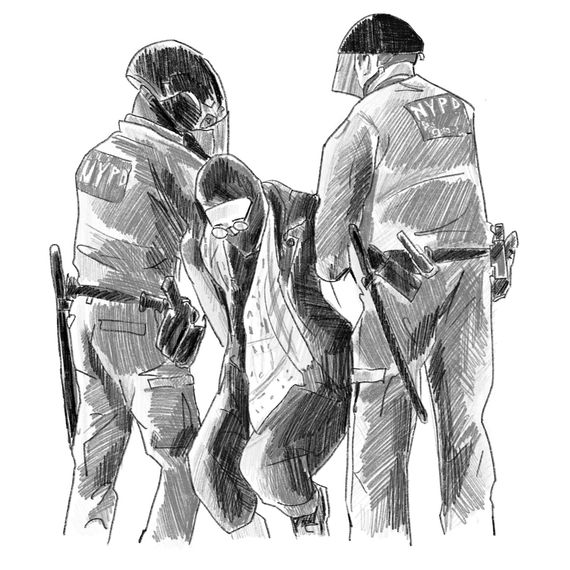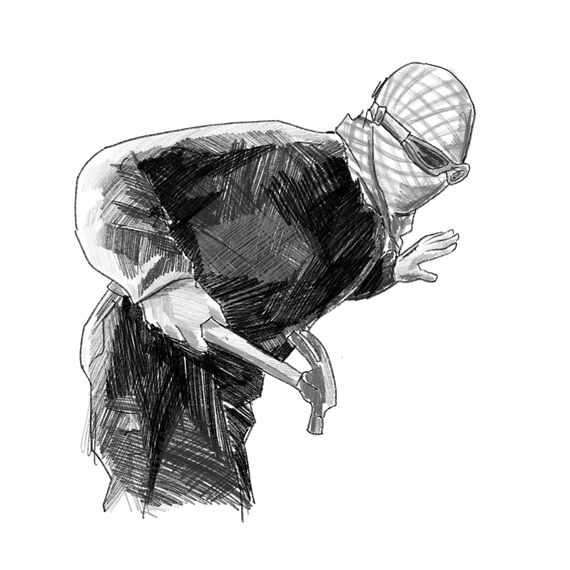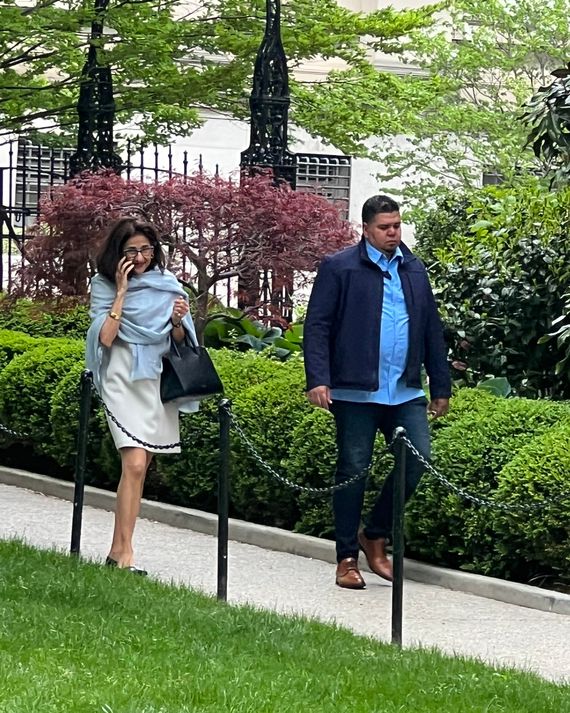
The Columbia Daily Spectator and New York Magazine conducted this poll of 719 students, professors, and others between April 26 and May 2. Only active members of the university community, verified by email, were able to participate. Answers that do not sum to 100 percent indicate blank, neutral, or uncategorizable responses.
Cover Story
What is your role at Columbia?
Undergraduate student: 69%
Graduate student: 23%
Faculty or instructor: 5%
Staff: 3%
Administrator: <1%
Do you consider yourself …
Atheist or agnostic: 39%
Jewish: 35%
Christian: 15%
Muslim: 3%
Hindu: 2%
Buddhist: 1%
Other/prefer not to say: 5%
Do you consider yourself …
Female: 61%
Male: 34%
Nonbinary: 4%
Prefer not to say: 1%
What are your political views?
Very Conservative: 0%
Conservative: 5%
Moderate: 18%
Liberal: 40%
Leftist: 35%
Other/too complicated to explain: 2%
On Speech:
Antisemitism at Columbia is a problem.
11% Strongly disagree
22% Disagree
19% Agree
33% Strongly agree
Islamophobia at Columbia is a problem.
8% Strongly disagree
15% Disagree
25% Agree
34% Strongly agree
I can freely express my political views on campus.
29% Strongly disagree
28% Disagree
16% Agree
8% Strongly agree
I have views on the conflict that I avoid publicly.
6% Strongly disagree
14% Disagree
24% Agree
41% Strongly agree
I feel safe on campus.
17% Strongly disagree
24% Disagree
24% Agree
17% Strongly agree
I hope that the pro-Palestinian protesters’ demands are met.
30% Strongly disagree
7% Disagree
13% Agree
45% Strongly agree
On the university president:
What did you think of Minouche Shafik’s testimony before Congress?
37% She said what was necessary to avoid Claudine Gay’s fate.
23% She sold out her students.
13% I don’t know enough to say.
12% She couldn’t handle the questioning.
3% She was excellent.
Her administration has handled the demonstrations well.
77% Strongly disagree
13% Disagree
3% Agree
1% Strongly agree
What do you think of her decision to the NYPD to arrest protestors?
57% The aggression was totally unwarranted.
19% I’m glad she came down hard.
12% She made an understandable mistake under pressure.
How do you feel about Shafik?
Pusillanimous and antagonistic toward the principles of liberal education. • A coward who puts her students down to appeal to the people in power. • She suuuuucks. • Strongly respect her. • Her hands are tied. • I doubt any other university president under the same pressures would act differently. • She has been placed in an impossible situation. This often happens to women of color who hold positions of power. • Bad decision after bad decision — but who would replace her? Most likely someone worse. • A young president who has made grave missteps. I’m ashamed. • Bootlicker. • It takes a different level of incompetence to have everyone from both sides of this issue calling for her resignation. • Impulsive, insincere, and silent. • I had extremely high hopes, and she has proven she cannot handle the job. • I’m having a hard time seeing the importance of a university president, and it almost seems like some sort of puppet role. • Cowardly, incompetent, and neoliberal to the core. • Anybody who calls in the NYPD to crush a student protest is morally unfit to lead a university. • Universities need wartime presidents now. • It’s impressive how poorly her short time here has gone. lose-lose situation that I hope she somehow wins. • I have met with her twice. She seems to be making decisions on a moment-by-moment basis rather than with intention. Furthermore, I think she is listening to the loudest and most powerful voices and is ignoring the concerns of students. • She’s basically doomed. And honestly? Good riddance. • She is a servile careerist. She was never a scholar or professor. She is a middle manager taking orders from donors and politicians. • (Respondents who said “spineless” or a variant: 15.)
Should Shafik resign?
50% Yes.
32% Yes. She’s stifling freedom of speech.
10% Yes. She’s doing too little to combat antisemitism.
8% Yes. For other reasons.
40% No.
10% Other.
On protesting:
How closely are you following the protests at Columbia?
50% It’s all I can think about.
43% It’s become a bigger part of my life.
4% I’m a lot more focused on academics.
How have the protests affected your friendships or romantic life?
It’s hard for me to be friends with people who aren’t on the same moral level as I am. • I’ve found myself reaching out to friends I fundamentally disagree with, just making sure they’re okay. I’m surprised by my behavior, but I think it’s my own way of resisting cruelty. • Many new friendships. Many friendships destroyed. • I have lost almost all my non-Jewish friends. • My romantic life is confined to the Israeli sphere. • All my friends hate me. • This has narrowed my dating prospects abysmally.
How have they affected your academic work?
Professors are worried about speaking about the conflict due to fears of getting fired. Students are policing one another and recording classes without consent. • I’m supposed to be writing three papers, but I am compelled to check Instagram every five minutes in case something is happening. • All I can think about is the protests. But let’s be clear: This is the point. The point of protesting is to disrupt and distract. It is working. • As a person of color, I am scared to go to libraries knowing there are dozens of cops outside. • I lost my internship because I went crazy.
As you watch similar protests spread across the country from Columbia, how do you feel?
49% Pride
31% Horror
6% Indifference
Have you participated in any campus activism recently on any side?
58% Yes
29% No
13% Thinking about it
How has your stance on pro-Palestinian activism changed?
73% My position is unchanged.
9% I was supportive at first — but after things escalated, I’m against.
6% I wasn’t supportive at first — but after things escalated, I’m in favor.
12% Other
The consequences protesters have faced — including arrests and suspensions — are appropriate.
53% Strongly disagree
10% Disagree
9% Agree
22% Strongly agree
Thinking of the disruption, is it worth it?
45% Yes — this sort of action and debate is why we’re here.
31% No — I feel cheated out of my Columbia experience.
14% Sort of — I’m annoyed, but it’s a sacrifice worth making.
ON what’s next:
Professors and instructors: What are your students learning from all this?
They are more powerful than they might have known. • How the public sphere functions and how many so-called liberal institutions in western democracies are completely illiberal. • They are learning about the difficulty of social and political change, about the cynical power maneuvers of politicians and the wealthy, and about the gap between media representation and reality. • They continue to be reminded that older generations do not understand the violent world they’ve grown up in. Furthermore, they now believe the adults don’t care to understand. • Nothing. • I fear they are learning that this is a cynical institution that will sell them out even to get nothing in return. • Lawlessness.
Students: What would you say to someone considering applying to Columbia?
Applying here is both the best and worst decision I’ve ever made. • Columbia only likes the idea of students being outspoken about issues. • We are the protest Ivy. We believe in action. • Take care of yourself at this institution, because the administration will not. • This institution will not protect you. You need to be content with the notion that we keep each other safe and prepared to fight for it. • Attending any elite institution presents the possibility of being thrown onto the global stage. • Don’t just come here for the name. Make sure this is something you can handle. • Don’t let this deter you from pursuing such an incredible opportunity to learn. The value of the academic rigor at Columbia remains unchanged. • The problems on campus are not unique to Columbia. Rather, they are endemic to a model of higher education in which universities are beholden to the political wills of their elite donors. • The university should be a means to an end. Come with a clear goal. • (Respondents who said “Don’t”: 39.)
Administrators: What do students misunderstand about Columbia, the institution?
It is a business, and you should not forget that. • Columbia University has existed for 270 years. This too shall pass. • They seem incapable of grasping complexity.
Staff members: What does the conflict between students and the administration look like from your perspective?
We are working with a bunch of amateurs. • Watching the administration handle things has really helped with my ever-present imposter syndrome. • The administration is functionally disinterested in the perspective of students, individuals they perceive as transient participants at best, naïve or puerile at worst.


